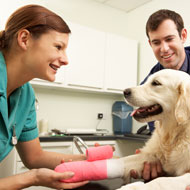RVNs ‘must not be seen as a cheap solution’

The remarks ‘did just not cause upset over a word (mundane) but highlighted a misunderstanding about roles and disagreement over wages' - Wendy Nevins, BVNA president.
The BVNA has responded to comments by CVS chief Simon Innes, in which he suggested that vets’ ‘mundane work’ should be given to veterinary nurses.
Writing in Vet Record (Vol 184 No 11), BVNA president Wendy Nevins states that while BVNA welcomes the support of corporates to secure more responsibility for veterinary nurses, the profession ‘must not be seen as a cheap solution for off-loading uninteresting work’.
She said the remarks ‘did just not cause upset over a word (mundane) but highlighted a misunderstanding about roles and disagreement over wages.’
‘We do need to let our nurses do more clinically’
Mr Innes is reported to have made the comments during Animal Health Investment Europe, an event dedicated to showcasing emerging animal health companies.
In an article published in Vet Record (Vol 184 No 10) he is quoted as saying: ‘I think if we asked vet nurses to do more and vets did more sophisticated treatments, we’d have less vets but we could actually pay those vets more. That might sound simplistic, but I believe it’s a possibility.
‘We do need to let our nurses do more clinically. When you look at human health and compare. I think you’ve [vets] done pitifully little and I think it’s time to create a more rewarding and fulfilling career for our nurses. I think the Americans are showing us the way - they have vet techs.
‘Some of the reasons that vets leave is that they don’t like the mundane work so let’s give that mundane work to our nurses.’
‘A commercial lens that reduces client relationships’
Wendy Nevins said that while his comments came from a financial standpoint, viewing RVNs simply as a cost to the practice ‘does not acknowledge their potential as fee earners and revenue generators’.
‘The RVN is arguably at the heart of the practice’s relationship with owners,’ she continued. ‘Client contact is highest at the start and end of life of an animal, when advice on prevention and support for the owner are foremost, rather than clinical intervention.
‘A commercial lens that reduces client relationships to concepts like ‘grudge purchases’ and ‘billing targets’ is blind to this. It does not see profit, duty or service in educating the public or understanding owner wellbeing.’
‘Undermines the vital working relationship’
The BVA has also responded to the comments, stating that the suggestion was not only poorly worded but ‘completely at odds’ with the joint ambition of the Vet Futures and VN Futures initiatives.
BVA junior vice president Daniella Dos Santos writes in Vet Record: ‘Implying that vets are looking to offload routine tasks onto vet nurses undermines the vital working relationship between the two roles as well as appearing to cast a value judgement on whether both should be allowed to feel career satisfaction in the pursuit of common goals.
‘BVA and the BVNA wholeheartedly recognise the value of vet nurses as an integral part of the vet-led team. There needs to be a positive and progressive approach ensure that all members of the vet-led team feel fulfilled and supported in their careers.’
‘Significant career benefits for nurses’
CVS director of nursing Belinda Andrews-Jones said: “Whilst we can argue about the use of the word mundane, the clear thrust of the article was one in which I was in full support. Greater delegation to Registered Vet Nurses, making use of their considerable knowledge and expertise, has to be the future.”
“Clearly there would be significant career benefits for nurses, but it would also free up veterinary surgeons’ time helping resourcing during the well-reported shortage of veterinary surgeons in the UK.
“CVS believes that there are opportunities for nurses to be involved in more preventative health consultations, more diagnostic imaging and more surgical tasks for example. There are opportunities to introduce nurse prescribers where RVN’s are trained and legally allowed to prescribe a range of POM-V drugs such as flea and worm treatments. This would complement the veterinary nursing role and help the practice teams.’
She continued: “There is still much to do to enable veterinary nurses to do more clinically, including much-needed changes to the Veterinary Surgeons Act and also raising awareness among vets and nurses about what nurses can do under Schedule 3 of the Act.
“CVS hopes to persuade our colleagues within vet practice as well as the profession that even within existing legislation boundaries we can work towards nurses being allowed to take on additional tasks well within their skill set, something our CEO Simon Innes has been trying to do for some time.”



 The Veterinary Medicines Directorate (VMD) is inviting applications from veterinary students to attend a one-week extramural studies (EMS) placement in July 2026.
The Veterinary Medicines Directorate (VMD) is inviting applications from veterinary students to attend a one-week extramural studies (EMS) placement in July 2026.